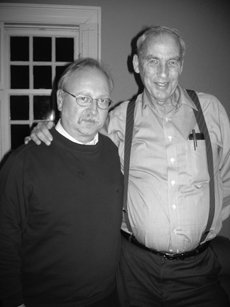Dr. Bernhard Lehman and Leo Brux spoke to Guilford students, professors, and members of the Greensboro community with speeches on March 21 and 23 respectively. Lehman spoke about his work in the small German town of Gersthofen, where he struggles to uncover the town’s Nazi past. Brux discussed the idea that, from a German perspective, the United States may be on a path of self-destruction.
Both men are Guilford teachers as part of the Munich study abroad program. Lehman teaches history while Brux has taught several subjects, ranging from philosophy to history to political science. Brux has also served as the resident director for the program two times.
Lehman spoke first in a lecture given March 21 in the Gallery. In that lecture, he described the work he is doing to uncover the past and the resistance he is meeting by doing so.
“Whoever tries to dredge up the history of National Socialism on the local level,” he began “will, even today, almost inevitably be confronted with resistance, obstacles, rejecting attitudes of witnesses, and sometimes even with open hostility.”
Using students from his history classes as research assistants, Lehmann overcame being repeatedly denied access to city archives that contained information about slave workers at the local chemical factory.
The mayor refused access several times before a court ruled it must be granted.
“My students learned that on the local level there are still powerful interests at work that try to prevent a reappraisal of the history of National Socialism,” Lehman said. “But they also learned not to give in so easily and to fight for something they believed in.”
Lehman’s work helped to raise awareness and donations, as the group raised over $65,000 Euro ($85,000 US) to give as reparations to forced laborers.
“I really got the feeling that he’s not after the money,” said a German-born member of the audience. “I think more important to him is the act of saying sorry, of acknowledging the wrongs of the past. It is a truly humane gesture.”
Junior Aaron Saunders agreed, saying, “It taught us we shouldn’t hide our past. We should bring it to light so that we can scrutinize it, criticize it, and learn from it.”
While Lehman discussed Germany and its history as a historian, Brux spoke about the United States and its future as a political scientist.
Brux repeatedly cautioned the crowd that he would examine things with an “atmosphere of optimistic pessimism.”
Optimistic pessimism, according to Brux, means that if one knows the future is bleak, holding nothing but tragedy, one can face it with strength, dignity, and confidence.
He applied this theory to the United States.
Among the problems with the United States Brux presented were loss of “soft power” around the world, a growing income gap, a more exclusionary society, growing international debt, and the decline of reason for things like morals and ideals.
The loss of soft power – cultural influence – was an important point, touched on more than once.
“In the 1950’s American culture was the model,” Brux said. “Everyone wanted to be like the United States with the cars, skyscrapers, music, and blue jeans.”
“Wouldn’t it be nice if people around the world still met Americans with awe,” he added.
“It is rare to find someone in this country who is as candid in their opinions of where it is heading,” Saunders said, “especially when that picture is so bleak.”
“Leo’s talk brought a new perspective to my idea of being an American,” said senior Eric Gray. “So much of his talk made sense. I wish he could’ve had a bigger audience so he could’ve reached more people.”
While Brux focused on negative aspects of the United States, he did offer a bit of advice for the future.
“Send young Americans to foreign countries to live for some months,” he said. “Let them experience that the rest of the world is more than the rest of the world. Every nation has their own idea of freedom and their own way of life.”
Editor’s note: This story originally ran with a picture of Bernhard Lehmann, a German artist, as opposed to one of the Bernhard Lehman who spoke at Guilford College.

